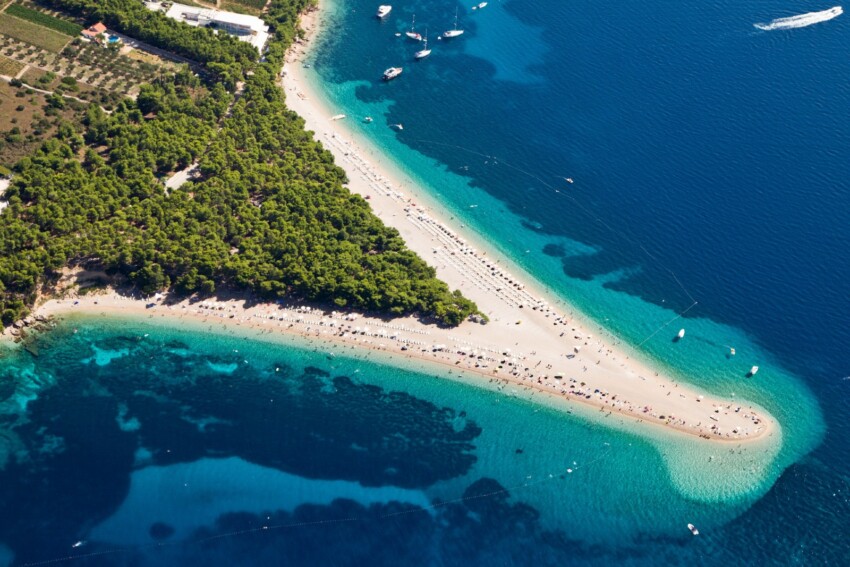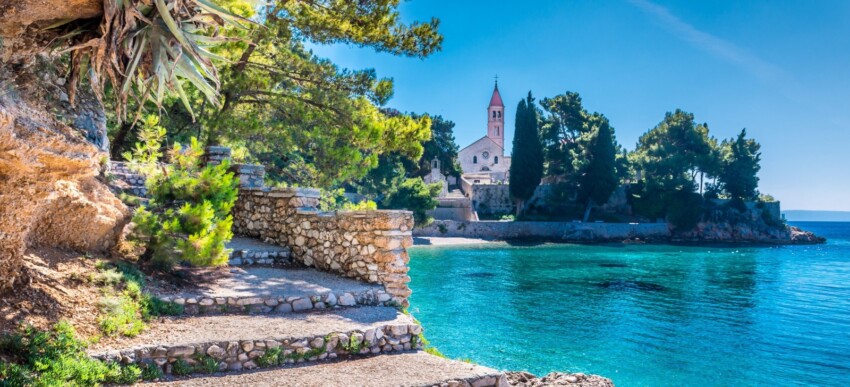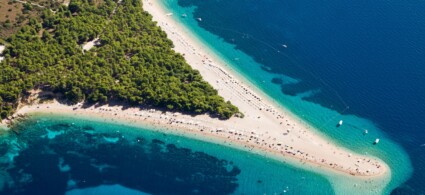

Brac is the largest island in Dalmatia and the third largest in Croatia.
Many visitors come to the island of Brac wanting to see the most photographed beach in Croatia, Zlatni Rat, for themselves. This tongue of pebbles jutting out into a crystal-clear sea is no match for more exotic and distant destinations.
Despite the lure of Bol, Brac is a less touristy and worldly island compared to Hvar and Korcula, and is an excellent choice if you are looking for an easy-to-reach destination, plenty of sunshine, a clean sea and a picturesque landscape of pine forests, Mediterranean macchia and steep cliffs sloping down to the sea.
Brac can also boast of having provided the raw material for the construction of one of the world’s most spotlighted buildings, the magnificent White House in Washington. Another historical building constructed from Brac’s prized white stone is Diocletian’s Palace in Split.
Stone quarrying used to be one of the island’s main industries, but today the islanders prefer to focus on tourism.

Supetar is the administrative capital and also the main port of entry to the island. Ferries from mainland Croatia arrive here and many Croatian families, as well as many international tourists, choose to stay in the capital and spend their days on the surrounding beaches.
It is certainly a good base from which to explore the island, but it is worth a visit in itself. The centre is really pretty, with its narrow stone streets, Austrian-style buildings, small harbour and imposing church, and the atmosphere is relaxed, perfect for those who want a holiday without dress code anxieties.
In summer, numerous cultural events are organised, often outdoors and free of charge, with classical and traditional music concerts, dance and theatre performances.
Don’t miss the village of Škrip, just 8 km from the centre of Supetar. It is the oldest inhabited settlement on the island and still has remains of the ancient Illyrians and Romans.
Interesting to know: if you love cemetery tourism, visit the cemetery at the end of Cape St Nikolaus and admire the monumental Mausoleum of the Petronovič family, created by the sculptor Toma Rosandič.

Forget quiet Supetar: Bol is a different matter altogether. This secluded coastal village on the southern side of the island might have remained an oasis of tranquillity had word not spread about the beauty of its main beach.
The old town is nice to visit, although it offers no special attractions, while the natural surroundings are breathtaking. This gave rise to a thriving tourist industry years ago, which is now well established. The hotels in the centre are all connected by a pleasant seaside promenade.
Another walk of about 5 km takes you to the Dragon’s Cave, the walls of which are covered with bas-reliefs whose origin is still unclear. Possibly the work of a monk with a vivid imagination, they depict angels, animals and a dragon.
Unfortunately, the cave is only open to the public on guided tours of the local tourist office.
For a quiet holiday away from the crowds of Bol, stay in one of the small coastal villages of Sumartin, Splitska, Milna and Pucisca.

The Zlatni Rat (Golden Horn) beach is the main attraction of the island of Brac and one of the most famous beaches in Croatia – you may have seen it in a travel guide or Croatia advertising brochure.
It juts out into the sea like a tongue for a few hundred metres, but its shape changes depending on the waves and the wind.
With its azure blue sea that suddenly turns deep blue, the dazzling white of the pebbles and the green of the surrounding pine forest, seen from above, this beach looks like a coral atoll. And once you set foot on it, you too will think you are on an earthly paradise.
There are five rocky beaches along the Supetar coastline, perfect for a day at the sea without having to travel far from the town. Vrilo is only 100 m from the old town centre, while further to the west are the beaches of Vlačica, Banj, Bili Rat and Vela Luka.
Bays and coves not to be missed around Sumartin are Radovnja, Zvirje, Rasotica and Studena.
Lovrečina is a beautiful bay in the northern part of the island, famous for its sandy beach surrounded by greenery, about 3 km long. The beach is very quiet, with a bar and a small harbour.
Choosing where to stay on Brac will definitely influence your holiday. The island is indeed very large, and you can decide to visit all of it, part of it, or stay in one village and stay there. Either way, Brac is impossible not to visit its most famous beach, the beautiful Zlatni Rat; the village of Bol is the only one on the sea on the south coast, so it could be a good base for your holiday.
Alternatively, you could decide to stay in Sumartin, on the east coast, from where ferries to Makarska arrive and depart.
A good choice for accommodation, on the other hand, is the north coast, where Supetar, the island’s main town with over 3,000 residents, is located. Finally, a few kilometres west of Supetar is Sutivan . It is a quiet town with a nice marina and a beautiful coastline.

On the island of Brac, numerous sports activities can be enjoyed, such as windsurfing, hiking, mountain biking and tennis.
For those wishing to dive Bol is perhaps the best base, but diving centres can be found at other locations on the island.
Local tour operators organise boat trips around the island, allowing you to admire the many coves and inlets dotting the coastline, and excursions to other nearby locations such as the Blue Cave in Biševo or the Krka waterfalls, with the possibility of rafting on the Cetina River.
To reach the island of Brac with your car, you can take a ferry from Split or Makarska: the first arrives in Supetar, the other in Sumartin.
There are also numerous passenger ships connecting the island with other Croatian towns and islands, namely Dubrovnik, Hvar, Korcula and Pomena.
There is an airport on the island that is connected to some cities in mainland Croatia and other European destinations, but it is not a very convenient option.
There are direct buses from Zagreb to Bol.
The beautiful island of Brač lies off the coast of Croatia's Dalmatian region. It is a very large island, with an elongated oval shape, 35 kilometres long and 12 kilometres wide. Its entire north coast faces the coastline of mainland Croatia, between Split and Makarska, while the south coast faces the island of Hvar.
It is finally separated to the west from the island of Solta by a narrow arm of sea about 800 metres wide. As with most of the Dalmatian islands, the nearest point in Italy as the crow flies is Gargano, in this case the town of Peschici, some 155 kilometres away. Brač, however, lies at the same latitude as Civitanova Marche, from which it is approximately 210 kilometres away.

